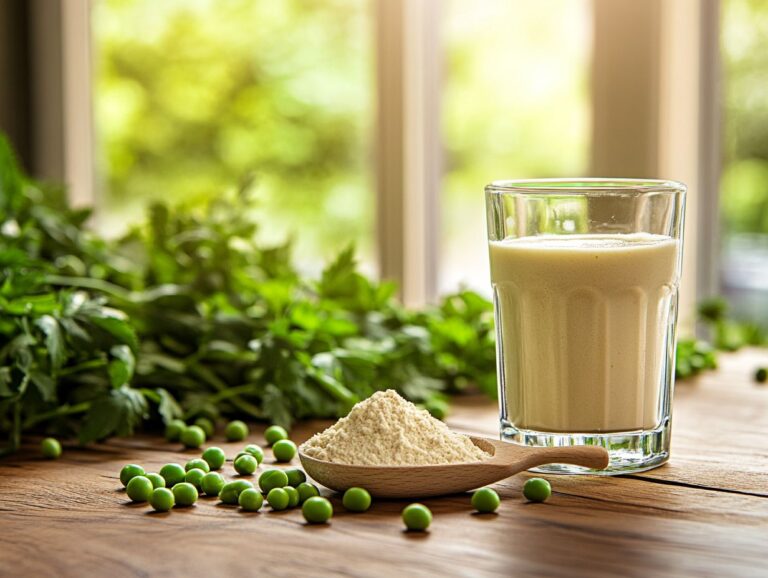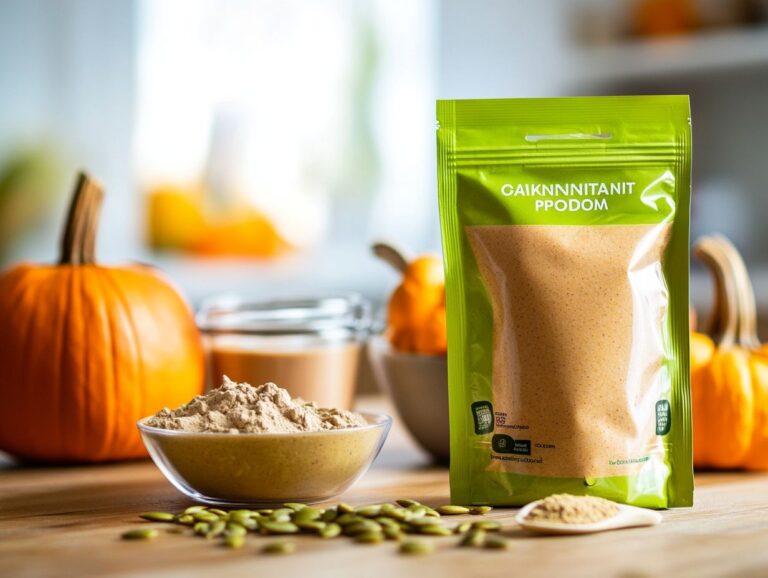NutriBiotic Rice Protein is a plant-based protein powder that is increasingly popular each year as a nutritious supplement for those looking to enhance their diets, including those seeking an organic vegan option. This article discusses what NutriBiotic Rice Protein is, its ingredients, and the manufacturing process. It also explores its numerous health benefits, including its high protein content, energy boost, and its compatibility with vegan, vegetarian, and low-carb diets. Additionally, potential side effects and alternatives should be considered to ensure the best choices for health and wellness.
What Is NutriBiotic Rice Protein?
NutriBiotic Rice Protein is a high-quality, organic vegan protein powder derived from sprouted brown rice. It serves as an excellent source of gluten-free, non-GMO, plant-based protein, and is considered a trusted source for those seeking sustainable sourcing.
Produced in California, this nutritional supplement caters to a wide range of dietary preferences, including vegan, keto, and low-carb diets, while ensuring customer satisfaction and great value with its simple ingredients and affordable pricing.
What Are The Ingredients Of NutriBiotic Rice Protein?
NutriBiotic Rice Protein is crafted from carefully selected ingredients to provide an organic, gluten-free, and GMO-free protein source that meets the needs of health-conscious individuals. This protein powder primarily consists of high-quality sprouted brown rice, ensuring a clean and simple ingredient profile with no chemicals.
One of the key nutritional characteristics of NutriBiotic Rice Protein is its richness in essential amino acids, including branched-chain amino acids, which are vital for muscle recovery, overall health, and serve as a soy alternative. The sprouting process enhances the bioavailability of nutrients and increases the protein content of brown rice, making it an excellent option for those looking to incorporate more plant-based proteins into their diet.
Additionally, this ingredient is high in dietary fiber, which promotes digestion and helps with feelings of fullness, making it beneficial for weight loss. NutriBiotic Rice Protein accommodates a variety of dietary needs, including those of vegans, vegetarians, and individuals following a gluten-free diet, while offering a nutritious and energy-boosting product.
How Is NutriBiotic Rice Protein Made?
NutriBiotic Rice Protein is derived from sprouted brown rice, a method that enhances its nutritional value and ensures the final product is both organic and plant-based. This manufacturing process effectively preserves the amino acids while producing a protein powder that boasts high digestibility and is allergen-friendly.
The process begins with sourcing high-quality sprouted brown rice, known for its rich nutritional profile and natural gluten-free properties. The rice undergoes careful sprouting, which activates enzymes that break down complex carbohydrates, thus improving flavor and nutrient absorption.
As the rice is processed into powder form, the final product exhibits enhanced protein quality, making it an ideal choice for health-conscious consumers seeking a clean protein source. With no artificial additives and a nice flavor, this protein powder is versatile enough to suit a variety of tastes and usage occasions, while maximizing health benefits such as muscle recovery, weight management, and overall well-being.
What Are The Health Benefits Of NutriBiotic Rice Protein?
NutriBiotic Rice Protein offers a wide range of health benefits, serving as a healthy and low-calorie source of protein that contains no fat or cholesterol.
This plant-based protein provides a complete spectrum of essential amino acids, making it suitable for individuals following vegan, vegetarian, low-carb, or other health-conscious diets, including those with dietary preferences like IBS-C and gastroparesis.
1. High Protein Content
NutriBiotic Rice Protein boasts a high protein content, offering a substantial amount of protein per serving. This makes it an excellent nutritional supplement for athletes, individuals who exercise regularly, and anyone looking to increase their protein intake.
This remarkable protein source features a favorable amino acid profile and is easily digestible and allergen-free, making it suitable for those with dietary restrictions or sensitivities, and good for digestion.
The protein content of NutriBiotic aligns with that of other protein sources, such as whey or pea protein, and consistently provides a clean and pure alternative that is ideal for vegans and vegetarians.
A diet rich in high-quality protein is essential for muscle recovery, as it aids in repairing tissues damaged during strenuous exercise, which facilitates faster muscle recovery. Additionally, increased protein consumption can help sustain energy levels throughout the day.
2. Suitable For Vegan And Vegetarian Diets
NutriBiotic Rice Protein offers a rich blend of amino acids, making it an excellent addition to vegan, vegetarian, and vegan keto diets as a plant-based protein powder to help meet dietary needs.
This versatile protein powder can easily be incorporated into drinks and foods, such as smoothies, to enhance the overall nutritional value of meals, and it blends well for an ideal smoothie experience. It serves as a convenient way to boost protein content in post-workout recovery shakes or to mix into pancake, bread, or muffin recipes.
With its neutral taste, this rice protein powder blends seamlessly with fruits, nut butters, or leafy greens, making it perfect for a frothy smoothie or competitive market recipes.
3. Good Source Of Essential Amino Acids
NutriBiotic Rice Protein contains essential amino acids that are vital for muscle repair, immune function, and overall health. These amino acids contribute to the synthesis of proteins, which serve as the building blocks of the body, facilitating everything from tissue growth and repair to hormone and enzyme production.
The balanced amino acid profile of NutriBiotic Rice Protein in a person’s diet is associated with several positive health outcomes, including improved muscle recovery after exercise, weight management through enhanced feelings of fullness, sustained energy levels throughout the day, and can be used in health food and personal care applications.
Additionally, this protein is hypoallergenic, making its benefits accessible to a broader population.
4. Low In Fat And Cholesterol
One of the most significant advantages of NutriBiotic Rice Protein is its low fat and cholesterol content, making it an ideal protein source for individuals seeking to maintain a healthy diet without compromising protein quality.
By incorporating this protein into their meals, users can support their weight management goals and promote heart health. The low fat content can help reduce overall caloric intake, assisting those who wish to lose weight or maintain a healthy weight.
Additionally, the absence of cholesterol not only benefits cardiovascular health but also aligns with dietary preferences for a plant-based lifestyle. This compatibility with health benefits makes NutriBiotic Rice Protein an excellent supplement for anyone looking to enhance their diet while still obtaining a complete range of nutrients.
What Are The Potential Side Effects Of NutriBiotic Rice Protein?
The side effects of NutriBiotic Rice Protein are rare; however, they may include allergic reactions and digestive issues.
Understanding these potential side effects and their implications can help users of this protein powder make informed decisions.
1. Allergic Reactions
Allergic reactions to NutriBiotic Rice Protein, although uncommon, may occur in individuals who have sensitivities to rice or rice-related products.
People with known food allergies or intolerances, particularly to cereals, are at an increased risk and should be vigilant for any unusual symptoms after consumption, such as hives, swelling, or gastrointestinal distress.
Those who are already using NutriBiotic Rice Protein or are considering it as a dietary supplement should consult a medical professional before starting any new dietary regimen.
It is essential for individuals with known rice allergies to carefully review ingredient labels and seek out certified allergen-free products whenever possible.
2. Digestive Issues
NutriBiotic Rice Protein may cause digestive issues in some individuals, particularly if they are not accustomed to a high-fiber diet. These issues can manifest as bloating, gas, or discomfort and often occur when the body is suddenly introduced to new protein sources or experiences an increase in fiber intake.
Such reactions typically indicate that the digestive system may need time to adjust to these changes. The most common causes of these disturbances include the body’s difficulty in handling the increased fiber or the protein itself, especially if consumed in larger amounts than what the body is accustomed to.
To minimize the risk of discomfort, it is advisable to gradually incorporate NutriBiotic Rice Protein into the diet. Consuming the protein alongside easy-to-digest foods and drinking plenty of fluids can help maintain digestive health while allowing individuals to enjoy the benefits of this nutritious protein source.
3. Interactions With Medications
There is a risk of interactions between NutriBiotic Rice Protein and various medications, so users should always consult their doctor before taking this supplement.
This is especially important for patients with chronic health issues or those undergoing specific treatments that dietary supplements might interfere with.
Doctors can provide tailored recommendations based on a patient’s detailed health profile, helping to prevent potential side effects and reduced efficacy of certain medications.
Understanding the nutritional requirements and benefits of protein supplementation can support overall health and wellness.
However, it is crucial to ensure that any dietary additions align with the patient’s ongoing medical treatment and are considered a healthy product.
How To Use NutriBiotic Rice Protein?
NutriBiotic Rice Protein offers versatile applications, serving as a meal replacement, post-exercise supplement, or an ingredient in baking, cooking, and various recipes. As a high-quality protein powder, it meets diverse dietary preferences and offers a great value for those seeking healthy ingredients.
Its pleasant flavor and ability to blend seamlessly into smoothies and other dishes make it an attractive choice for consumers looking for healthy ingredients, especially those interested in organic vegan options.
1. As A Meal Replacement
Using NutriBiotic Rice Protein as a meal replacement can be an effective strategy for controlling calorie intake while ensuring sufficient protein consumption, making it a popular choice for individuals aiming to lose weight or maintain a healthy lifestyle.
This protein source aids in preserving muscle mass during weight loss and promotes feelings of fullness, reducing the likelihood of unhealthy snacking between meals. Its easily digestible nature makes it suitable for those with sensitive digestive systems, ensuring customer satisfaction.
Those who incorporate protein powder into their meal replacement diets often find it easier to meet their dietary goals, as it provides essential amino acids and other nutrients without excessive calories.
Additionally, this plant-based protein option offers a convenient and balanced solution for individuals with dietary restrictions, such as lactose intolerance or those following a vegan or vegan keto diet, helping them achieve satisfying and nutritionally adequate meals.
2. As A Post-Workout Supplement
NutriBiotic Rice Protein is an excellent post-workout supplement, providing the essential protein needed for muscle recovery and growth after exercise. This plant-based protein can significantly accelerate recovery and muscle growth, both of which are crucial for individuals striving to achieve their fitness goals.
To maximize its effects, it is important for users to know how to use this supplement effectively. Taking the protein shortly after exercise—ideally within 30 minutes—is recommended, as this is when muscles are most receptive to nutrients.
The protein not only helps repair muscle fibers but also reduces soreness, leading to a more efficient workout cycle. Additionally, being hypoallergenic, it caters to a wide range of dietary needs, thus offering health benefits to a more diverse population.
3. In Baking And Cooking
NutriBiotic Rice Protein is versatile and can be seamlessly incorporated into various baking and cooking recipes, enhancing both nutritional value and flavor. It is made from sprouted brown rice, ensuring it’s a trusted source of raw protein with no chemicals, GMO-free, and offering adequate proportions of necessary nutrients.
It can be easily added to smoothies, imparting a creamy texture and an extra protein boost, making it an excellent choice for post-exercise recovery drinks. The protein content and unique enzyme blend ensure a frothy smoothie experience.
For baking enthusiasts, NutriBiotic Rice Protein can be mixed into pancake batter or muffin mixes, increasing their protein content and helping to keep you feeling fuller for longer. Its nice vanilla flavor and easily digestible properties make it a favorite among those looking to enhance the taste and health benefits of their baked goods.
Additionally, it serves as a fantastic ingredient in vegan recipes, such as energy balls or protein bars, offering a convenient way to add balanced nutrition without compromising on taste. Its chocolate flavor option further diversifies its use in a variety of recipes, catering to different consumer preferences.
What Are The Alternatives To NutriBiotic Rice Protein?
NutriBiotic Rice Protein is an excellent protein supplement; however, there are many alternative protein options available on the market, including pea protein, soy protein, and whey protein, to accommodate various dietary needs and preferences. Despite a competitive market, NutriBiotic remains a great value choice due to its affordability and sustainable sourcing.
1. Pea Protein
Pea protein is a popular soy alternative to NutriBiotic Rice Protein and is especially favored by vegans and vegetarians due to its similar amino acid profile and high iron content.
This plant-based protein source is highly digestible and contains significant amounts of essential amino acids, making it an excellent choice for individuals aiming to support muscle growth and repair. It offers health benefits like promoting good digestion and is considered a healthy product due to its simple ingredients.
Its low allergenic potential also makes it suitable for those with common dietary restrictions, including individuals who are lactose intolerant or allergic to soy.
Additionally, pea protein is rich in fiber, which promotes digestive health and can create a feeling of fullness, aiding in weight management.
It can be easily incorporated into various culinary applications, such as smoothies, baked goods, and protein bars, enhancing both flavor and nutritional value.
2. Soy Protein
Soy protein is an excellent alternative to NutriBiotic Rice Protein, thanks to its high protein content and its well-documented health benefits for cardiovascular support and muscle preservation. It is known for its high quality and cost-effective nature in the protein supplement market.
As a complete protein, soy protein contains all essential amino acids, making it an ideal protein source for vegetarians and vegans. It also boasts beneficial compounds like isoflavones, which are associated with lower cholesterol levels and improved cardiovascular health. This makes it a trusted source of protein for those with specific dietary preferences.
While soy protein can aid in muscle development and repair, some individuals may experience allergies or digestive issues. It is important to weigh the pros and cons, particularly since moderation and a variety of protein sources are essential for balanced nutrition and overall health.
3. Whey Protein
Whey protein, derived from milk, is one of the most common protein sources globally. It has a high biological value and is effective for muscle recovery and growth.
This protein is particularly popular among athletes and fitness enthusiasts due to its fast absorption rates, which aid in quickly replenishing energy and enhancing post-workout recovery. Additionally, whey protein typically contains a higher concentration of essential amino acids for muscle growth compared to plant-based alternatives, leading to greater protein gains for those aiming to maximize their muscle-building efforts.
However, some individuals may have allergies to dairy or difficulty digesting it, prompting them to seek out plant-based protein options. While these plant-based proteins may be lower in certain essential amino acids, they often offer other health benefits, such as antioxidant properties and improved digestion.


